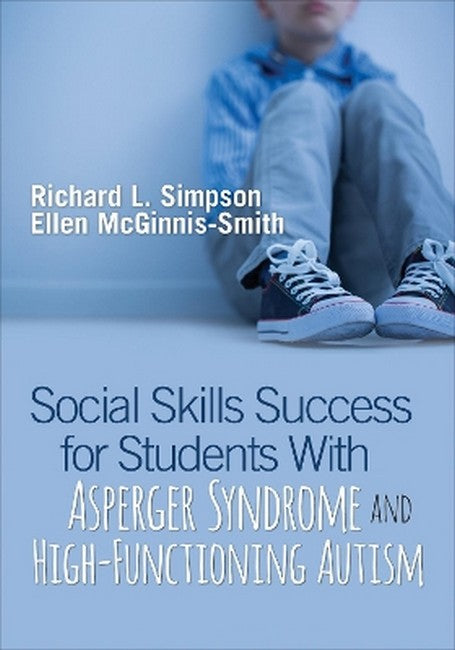Richard L. Simpson was Professor Emeritus at the University of Kansas. He was a member of the Department of Special Education faculty for over 40 years. While at the University of Kansas he directed numerous University of Kansas and University of Kansas Medical Center demonstration programs for students with autism spectrum disorders and other disabilities and coordinated a variety of federal grant programs related to students with autism spectrum disorders and other disabilities. He also worked as a special education teacher, school psychologist and coordinator of a community mental health outreach program. Rich authored numerous books, articles, and texts on a variety of topics connected to students with disabilities. Rich was the former senior editor of the professional journal Focus on Autism and Other Developmental Disabilities. His awards include the Council for Exceptional Children Research Award, Midwest Symposium for Leadership in Behavior Disorders Leadership Award, Autism Society of Kansas Leadership Award, and numerous University of Kansas awards and distinguished roles, including the Gene A. Budig Endowed Teaching Professorship of Special Education. Ellen McGinnis-Smith earned her Ph.D. in Special Education at the University of Iowa and certification as a school administrator from Drake University. She has been a teacher of special education at both the elementary and secondary levels for eleven years primarily in the area of behavioral disorders. Dr. McGinnis-Smith served as an educational consultant at Child Psychiatry, University of Iowa as well as in the public schools. She was principal of Orchard Place, a residential and day treatment center, in Des Moines, Iowa for 10 years and served as Director of Special Education for Des Moines Public Schools. She recently retired as a mental health and dispute resolution consultant for the Iowa Department of Education. Dr. McGinnis-Smith is the author of the Skillstreaming social skills programs. She and her husband, Carl Smith (also a special educator), have two adult children.
Request Academic Copy
Please copy the ISBN for submitting review copy form
Description
Preface Publisher's Acknowledgments About the Authors Chapter 1. Understanding Asperger Syndrome and High-Functioning Autism Autism Spectrum Disorders Children and Youth With Asperger Disorder and Other Types of High-Functioning Autism Social Skill and Social Interaction Physical and Motor Skill Challenges Case Example: Stanley Prevalence Summary Considerations References Chapter 2. Social Challenges and Foundations for Successful Outcomes Justification for Social Skill Instruction Challenges to Social Skill Instruction Strategies for Teaching Social Skills to Children and Youth With HF/AD A Foundation for Social Skill Instruction Social Skill Instructional Targets Summary Considerations References Chapter 3. Social Skill and Support Methods for Learners With Asperger Disorder and High-Functioning Autism Fundamental Instructional Methods for Children With High-Functioning Autism Social Skill Instructional Steps for Building Social Skill Capacity and Social Interaction Competency Summary Considerations References Examples: Social Skill Instructional Targets, Skill Development Steps, and Evaluation Chapter 4. Sample Social Skill Development Program Case Example: Jackson Category 1: Fundamental Social Interaction, Social Relationship, and Collaboration Skill Sample Program Category 2: Self-Advocacy, Self-Management, and Personal Accountability Sample Program Category 3: School-Related Social Skills Sample Program Summary Considerations References Chapter 5. Generalizing Social Skills: Challenges and Strategies Planning for Skill Generalization and Transfer Planning for Skill Generalization: Role-Playing and Practice Planning for Skill Generalization: Coaching and Performance Feedback Planning for Skill Generalization: Practice and Skill Rehearsal in Everyday Settings Summary Considerations References Chapter 6. Supports for Structuring, Organizing, and Managing Social Learning Supporting and Supporting and Promoting Acquisition and Performance of New Social Skills and Developing Social Interaction Competence Environmental Modifications and Structuring Procedures Social Skill Instructional Support Methods Summary Considerations References Chapter 7. Peer Supports Creating a Foundation of Social Acceptance and Positive Attitudes Positive Experiences Peer Recruitment Using Peers to Create and Display Appropriate Models of Target Skills Peer Involvement in Role-Play and Practice Peer Involvement in Coaching and Performance Feedback Peer Involvement in Assisting Learners to Practice, Rehearse, and Generalize Social Skills in Natural Settings Summary Considerations References Chapter 8. Parent and Family Involvement and Support Communication and Collaboration Facilitating Ongoing Communication, Information Exchange, and Collaborative Relationships Building Partnership and Skill Development and Support Relationships With Parents and Families Selecting Levels and Types of Parent/Family Involvement Summary Considerations References Index
"This book provides teachers and related service personnel with an up-to-date, practical, and practitioner-friendly resource for developing, implementing, and evaluating social skill intervention and support programs for students with Asperger Disorder and High-Functioning Autism. It is a great tool to increase teacher knowledge and parent awareness." -- Debi Gartland, Professor of Special Education, Towson University "Packed with practical, research-based activities to support students with High Functioning Autism or Asperger Disorder, this book is the answer for teachers and parents. It provides an understanding of Asperger Disorder and High Functioning Autism with steps to improve students' social and learning outcomes. Educators will find value in the detailed processes and activities as well as the ready-to-use materials." -- Renee Bernhardt, Supervisor of Special Education, Cherokee County School District

